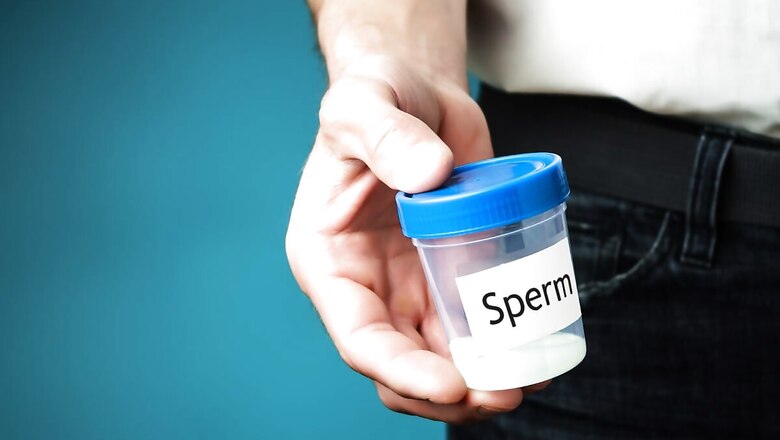
views
sex often resort to unverified online sources or follow the unscientific advice of their friends.
To address the widespread misinformation about sex, News18.com is running this weekly sex column, titled Let’s Talk Sex, every Friday. We hope to initiate conversations about sex through this column and address sexual health issues with scientific insight and nuance.
The column is being written by Sexologist Prof (Dr) Saransh Jain. In today’s column, Dr. Jain has addressed male infertility post-COVID and suggested some natural supplements which can be useful (along with medical help) to combat the condition.
The initial hypothesis that Covid-19 mainly impacts the respiratory system has been proved wrong by a body of research that points at various other organ damage and physiological conditions that result in the aftermath of a COVID-19 infection. Although there is no conclusive evidence, it is being observed that male fertility is also being affected due to COVID-19. Therefore, many doctors have
urged their patients, who had contracted Covid, to take fertility tests as soon as possible.
It is being suspected that COVID-19 infection might damage the function of testicles in men and impact the production of sperms or the formation of male sex hormones. Furthermore, COVID-19 induced depression and stress due to prolonged periods of isolation, medication, and suffering can also cause male infertility or reduce sperm count and affect men’s sexual prowess.
There might also be a temporary worsening of semen parameters. Whether these issues are permanent or if they resolve themselves is yet to be known conclusively. Covid-19 is likely to threaten male fertility in four ways:
Targeted Invasion
The high expression of ACE2 receptors — the virus’s favourite entry-point — in the testis is a concern. The presence of the ACE2 receptor on germ cells, Leydig cells, and Sertoli cells in the male genital system makes it a potential target of SARS-CoV-2 infection. Covid-19 causes a reduction of Leydig cells, while Sertoli cells can become inflamed and detached. These cells are critical for reproductive health and sperm production.
Inflammation
There’s also the worry that Covid-19’s effects and the resulting inflammation could cause temporary or permanent damage to reproductive tissues. Hyperinflammation around the heart and surrounding muscles may also block or narrow blood supply to the penis, causing erectile dysfunction. Research published in July suggests Covid-19 can exacerbate cardiovascular conditions, increasing the risk of erectile dysfunction and the chance of developing sexual and reproductive health issues.
Total inflammation of the testicles, a condition called orchitis, doesn’t appear to be common. However, the report explains that the immune system’s overreaction called cytokine storms, along with high fevers, may lead to orchitis. It can cause permanent reproductive function damage.
Interference
Covid-19’s resulting system-wide inflammation can also send the endocrine system out of whack. In turn, men’s testosterone and other sex hormone levels can be disrupted, compromising fertility.
Stress
Pandemic-related stress, anxiety, and depression can also cause a change in mood. Studies suggest this can also affect sexual health. Studies indicate that between 25 and 60 per cent of infertile individuals have significantly higher anxiety and depression than fertile men. Scientists don’t know for sure which came first — the stress or infertility.
It’s normal to experience some stress from time to time. But living with regular stress or dealing with highly stressful life events can cause drops in dopamine and serotonin production. This can negatively affect your Sexual Health and Fertility.
How to recover or boost sperm count?
While not all infertility issues resolve themselves on their own and need to be treated by a medical expert, some lifestyle modifications and natural remedies can support the hormones that control sperm quality, which may aid the healthy development of sperm and improve sperm count.
To improve sperm count, take a diet rich in antioxidants. Antioxidants help reduce the number of free radicals (molecules that damage your sperm) in the body. Therefore, increasing the number of antioxidant foods in your diet can help improve sperm count.
Getting enough Vitamin C and D is also essential. Vitamin C and D are good for boosting immunity. These nutritional supplements help increase the sperm count while reducing the number of deformed sperm cells (Lemon, Kiwifruit, etc.). Tomato is rich in Lycopene which improves sperm quality and production. COQ-10 is found in oranges, strawberries, cauliflower and nuts, and beta-carotene in sweet potatoes, carrots, and spinach are also helpful in boosting sperm count.
Omega 3-Fatty Acids found in almonds and walnuts are also useful for increasing sperm count. Ashwagandha, a medicinal herb with multiple health benefits, can also be helpful. It can reduce anxiety and stress, and helps fight depression, boost testosterone levels in men.
Cutting out junk food and substituting it with fresh fruits, vegetables, and whole grain-based foods is essential. Certain foods such as walnuts, citrus fruits, most fish, dark chocolate, garlic, bananas, broccoli, turmeric, most leafy greens, and fermented nuts and seeds are good for improving sperm count.
Read all the Latest News, Breaking News and Assembly Elections Live Updates here.

















Comments
0 comment